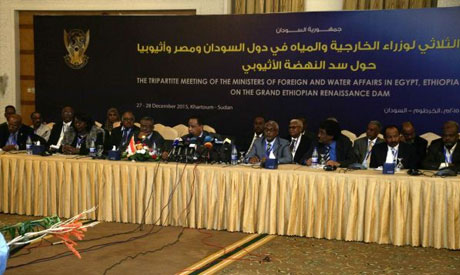
Sudanese Foreign Minister Ibrahim Ghandour (C) speaks during a joint press conference with delegates from Egypt, Ethiopia and Sudan following another round of talks on the Grand Ethiopian Renaissance Dam (GERD) project that has strained ties between Cairo and Addis Ababa in the Sudanese capital Khartoum on December 27, 2015 (AFP)
A two-day meeting started in Khartoum on Sunday between Egypt, Ethiopia, and Sudan’s irrigation and foreign ministers to attempt to overcome disagreements that have delayed the three countries in reaching a final accord over the controversial Renaissance dam for months.
Ethiopian foreign minister said Sunday that holding the meeting of six ministers for the second time after weeks shows willingness to abide by March’s declaration of principles.
“The peoples of Egypt, Ethiopia, and Sudan are tied by the Nile which represents our common destiny,” the foreign minister said.
The foreign minister said a common agreement must be reached between the three countries in order to achieve mutual interests.
The meeting was stepped up to the level of foreign ministers in December in order to tackle the issue in a political, not just a technical way.
A tenth meeting was held in Khartoum two weeks ago, which was initially due to take place on 21-22 November, to overcome disagreements about the firm that will conduct impact studies of the dam, with foreign ministers attending for the first time.
After that meeting, Egyptian Prime Minister Sherif Ismail said the negotiations were “difficult.”
French film BRL and Dutch firm Deltares were chosen in April by the three countries, but the Dutch firm which was assigned 30 percent of the work resigned, saying the conditions imposed by the tripartite committee and BRL did not guarantee independent and good quality studies.
The filling time for the dam reservoir of 74 billion cubic meters stirred fears over the impact of the dam on Egypt, which mainly relies on the Nile for its needs in water.
Ethiopia is due to start the first stage filling of the dam’s reservoir in six months, which amounts to 15 billion cubic meters out of a total of 74 billion.
Experts say reducing the filling time, estimated at 4-7 years, will reduce the impact on Egypt.
Ethiopia said several times that the dam solely aims to produce electricity, amidst fears that the Nile water share of Egypt will be reduced.
Fears about the change in the course of the Blue Nile water were raised in the media.
Egypt’s irrigation minister Hossam Moghazi explained in a statement Saturday that Ethiopia had changed the water course of the Blue Nile in 2013 to build the dam, and recently changed it back to its original course, also denying that water has started filling behind the dam.
The Nile provides Egypt with 85 percent of its water.
Short link: